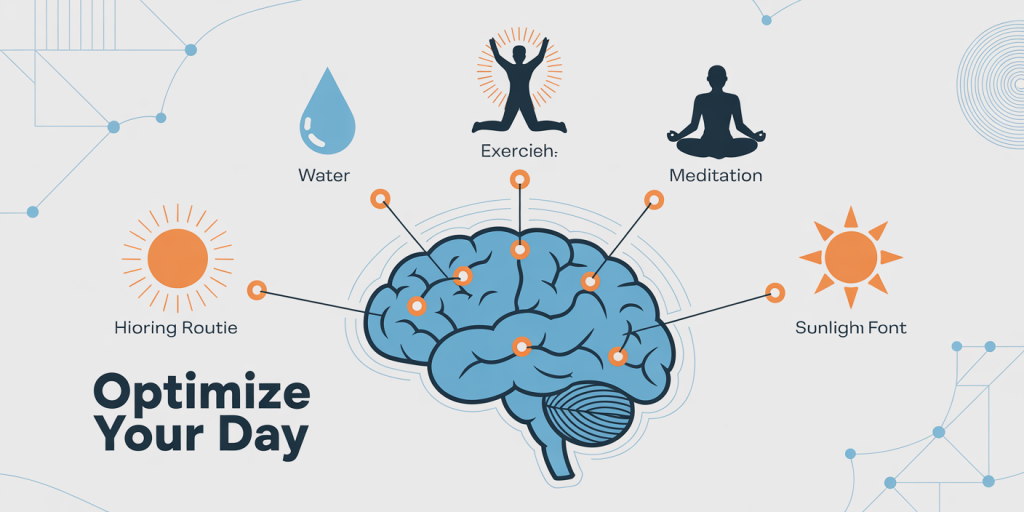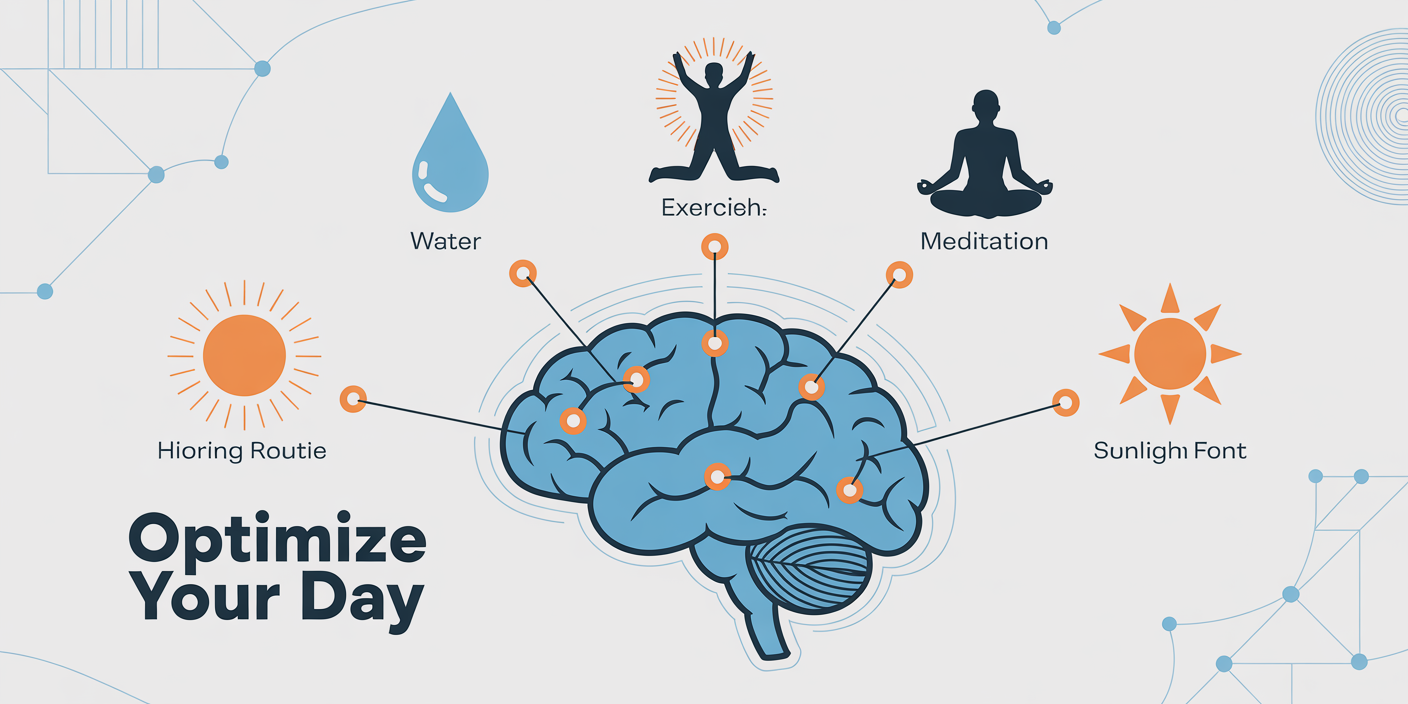The Science of Morning Routines: What Actually Works According to Research
Starting the day on the right note is often touted as a secret to productivity, happiness, and well-being. While countless morning routines flood the internet—from meditation to cold showers—what does scientific research actually say about their effectiveness? This article delves into the science behind morning routines, demystifying common practices while highlighting strategies proven to foster better mental clarity, physical health, and sustained motivation.

Understanding the Psychological Impact of Morning Habits
Morning routines serve as more than just rituals; they are anchors that set the tone for the entire day. According to a study published in the *Journal of Applied Social Psychology* (2017), individuals who engage in structured morning behaviors report higher levels of self-regulation and predictability in their daily lives. This sense of control is key in enhancing one’s resilience to stress and improving overall mood.
Structured morning routines can create a psychological buffer against the chaos of the day by triggering a cognitive framework that signals it is time to shift into productive mode. For example, former Apple CEO Tim Cook reportedly wakes up at 3:45 a.m. to engage in focused work before the distractions of the day start. This consistency creates neural patterns that help automate behaviors, reducing the need for decision-making early on and preserving mental energy.
The Role of Circadian Rhythms in Effective Morning Activities
Human bodies operate on circadian rhythms—24-hour biological cycles influencing sleep-wake patterns, hormone release, and other physiological processes. Research shows that aligning morning routines with natural circadian rhythms optimizes alertness and cognitive performance.
For instance, a study by Schmidt et al. (2015) demonstrates that exposure to natural light within the first hour of waking significantly improves mood and executive function throughout the day. Many successful morning routines integrate this by encouraging outdoor walks, sunlight exposure, or the use of light therapy boxes during winter months. Additionally, engaging in physical activity within the first two hours of waking can raise body temperature and cortisol levels to energize the mind and body, as evidenced in research from the *European Journal of Applied Physiology* (2019).
In contrast, some morning practices such as immediately checking emails or engaging with social media can disrupt circadian rhythm benefits by increasing cortisol unnecessarily and fragmenting attention.
Comparing Popular Morning Routine Components: What Science Supports
Various components make up common morning routines, including hydration, exercise, meditation, breakfast, and cold exposure. Here is a comparative analysis based on research evidence:
| Component | Scientific Support | Practical Benefit | Evidence Example |
|---|---|---|---|
| Hydration | Moderate—improves cognitive function after overnight fast | Prevents dehydration-related fatigue | Journal of Nutrition, 2019 |
| Exercise | Strong—boosts mood, alertness, and metabolism | Enhances energy, focus, and physical health | European Journal of Applied Physiology, 2019 |
| Meditation | Strong—reduces stress, improves attentional control | Enhances emotional regulation | JAMA Internal Medicine, 2014 |
| Breakfast | Mixed—depends on quality; balanced meals aid cognition | Provides sustained energy and prevents dips | Nutrients, 2020 |
| Cold Exposure | Emerging—potentially improves immune response and alertness | Boosts circulation; may increase alertness | PLoS One, 2018 |
For example, research on mindfulness meditation at the start of the day reveals improvements in focus and emotional resilience during stressful tasks (Goyal et al., 2014). Meanwhile, exercising shortly after waking can lead to higher calorie burn and enhanced neurochemical balance. However, cold exposure, though trendy, requires more longitudinal studies to confirm long-term benefits.
Real-World Cases: Morning Routines of High Performers
Examining the routines of high achievers gives insight into how science translates into practice. Oprah Winfrey practices meditation, journaling, and exercise within her first two hours, a choice grounded in reducing anxiety and boosting focus. Her routine reflects findings from studies like that of Tang et al. (2015), which links meditation with reduced stress markers.
Another example is Barack Obama, who prioritizes morning workouts—cardio or weight training—which aligns with research showing physical activity’s role in enhancing executive function and mood regulation. According to a National Institute of Health (NIH) review, even 20 minutes of morning exercise can increase dopamine and serotonin, neurotransmitters tied to improved mood and attention.
Such anecdotes emphasize combining scientifically validated practices rather than adopting a one-size-fits-all approach. Flexibility is key, especially considering individual chronotypes—some people are naturally “morning larks” or “night owls” and should customize routines accordingly.
Practical Strategies for Crafting an Effective Morning Routine
With scientific insights in mind, tailoring an effective routine requires balancing evidence with personalized needs. A few actionable strategies emerge:
1. Prioritize Consistency: Research by Foster et al. (2020) underscores that going to bed and waking at consistent times reinforces circadian rhythms, leading to better quality sleep and energized mornings.
2. Incorporate Physical Activity: Even short bursts of exercise between 10-30 minutes improve executive functioning and mood throughout the day, as per a meta-analysis in *Psychological Bulletin* (2018).
3. Use Natural Light Exposure: Aim to spend at least 15 minutes outdoors or near a bright window within an hour of waking. This synchronizes your internal clock, reducing grogginess.
4. Practice Mindful Meditation or Journaling: This enhances emotional regulation and reduces stress, easing cognitive transitions between sleep and wakefulness.
5. Avoid Digital Distractions Early: Postpone checking emails or social media to prevent cortisol overload and attention fragmentation. Instead, use the early morning window for low-stimulus activities.
A hypothetical sample morning routine, based on these points, might look like this:
| Time | Activity | Purpose |
|---|---|---|
| 6:30–6:45 am | Wake up, hydration | Reset circadian rhythm, prevent fatigue |
| 6:45–7:00 am | Light stretching, sunlight exposure | Boost cortisol naturally, increase alertness |
| 7:00–7:20 am | Moderate exercise | Improve mood, energy, and metabolism |
| 7:20–7:30 am | Meditation or journaling | Reduce stress, enhance focus |
| 7:30 am onward | Healthy breakfast | Maintain blood sugar, support cognition |
By rigorously applying such a routine, one taps into evidence-based benefits while supporting mental clarity and physical well-being.

The Future Landscape of Morning Routine Research
As neuroscience and behavioral psychology continue to evolve, the understanding of what optimizes morning routines will deepen. Emerging technologies like wearable devices offer real-time data on sleep cycles, heart rate variability, and stress markers, providing personalized feedback on routine effectiveness. For example, smart alarms that wake individuals during optimal sleep phases already show promise in enhancing alertness.
Furthermore, integrative health approaches combining chronotherapy (timing treatments and routines per biological clock) with nutrition and exercise science may redefine morning practices with greater precision. Advances in understanding the gut-brain axis might also influence recommendations for morning meals supporting cognitive and emotional resilience.
Artificial intelligence-driven apps that adapt morning routines based on mood and productivity patterns could soon provide tailored daily suggestions backed by large datasets, making scientific insights accessible to wider populations.
In summary, future research aims to refine morning routines beyond generic advice, focusing on personalized, data-supported strategies that maximize well-being and performance. This shift will likely make morning practices more effective, sustainable, and enjoyable.
Morning routines are far from trivial; they hold profound implications for mental and physical health. Grounded in science, practical morning strategies emphasize regularity, movement, mindfulness, and light exposure while discouraging early digital distractions. By harmonizing habits with biological rhythms and personal preferences, individuals can truly harness the power of mornings to shape successful, balanced lives.

